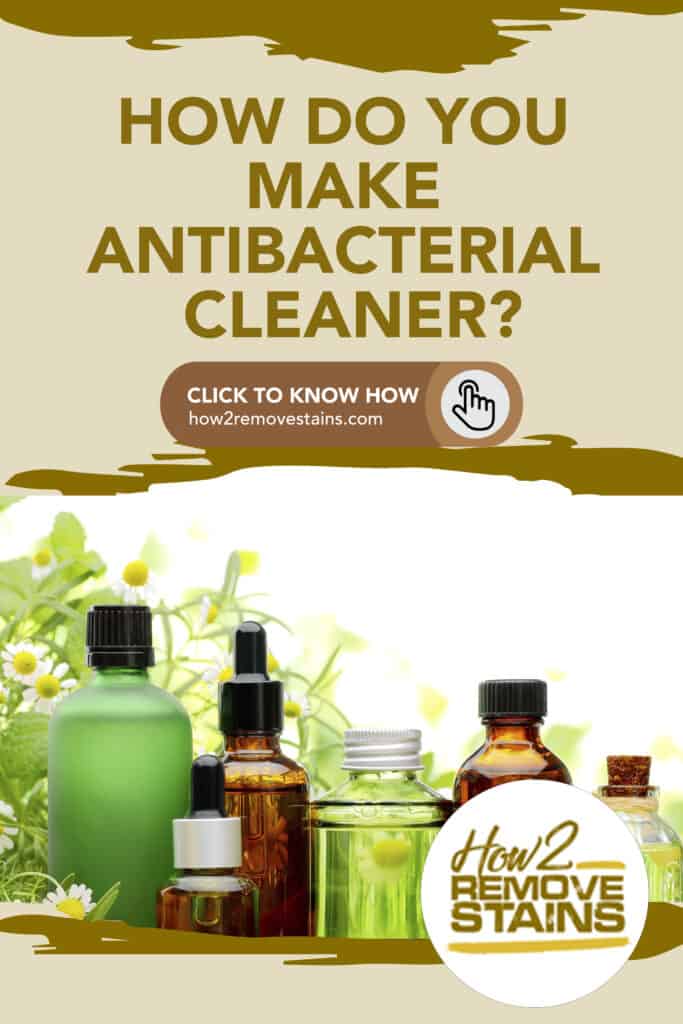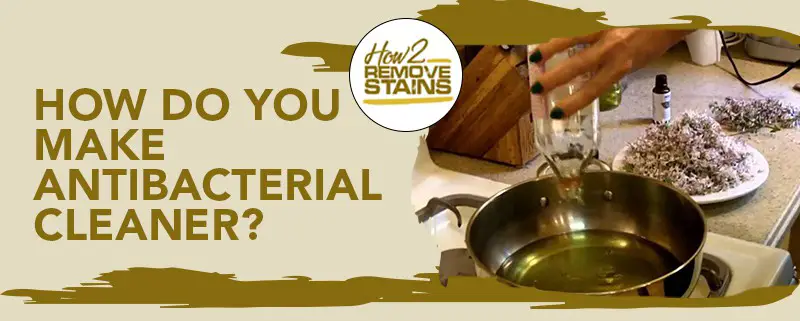Making a homemade antibacterial cleaner is a piece of cake. Gone are the days when you have to go to the grocery store to buy cleaning products. With only a few ingredients available at home, you will be able to protect your household from numerous bacterial threats.
These antibacterial cleaners you can make at home are composed of natural ingredients that kill and disinfect bacteria. They are all cheap, simple, and safe to use.
Table of Contents
Antibacterial cleaner spray
White vinegar is the most effective ingredient in this antibacterial recipe. It is commonly used in most antibacterial products and it kills 99% of germs. Combined with essential oil, it is even more effective.
Be aware that you will need something stronger than vinegar to kill germs from viruses like Covid 19.
What you’ll need:
- 1/2 cup white vinegar
- 3/4 cups of water
- 15 drops of tea tree or lavender essential oil
- A spray bottle
- A funnel (optional)
Directions:
- Using the funnel, place the white vinegar and water in the spray bottle. Mix them until the vinegar dissolves in the water. Vinegar is a natural antibacterial ingredient that helps keep away the germs at home.
- Now add 15 drops of tea tree or lavender essential oil in the bottle. If both ingredients are available at home, add them together. Essential oils are also antibacterial.
- Close the bottle and shake them a bit to blend the ingredients. In a minute or two, your antibacterial spray is ready to use. You can use it on your doorknobs, countertops, and tables.
Antibacterial cleaning wipes
In this recipe, the most important item is not the ingredients but the sealable container. The best choice is a glass container that can be sealed properly.
If you can’t find any thieves oil at home, you can make use of any essential oil that is available. Most essential oils are antimicrobial agents and make good substitutes.
Ingredients you’ll need:
- 70% isopropyl alcohol or vodka
- 1 tbsp. dish soap
- 10 drops of disinfecting essential oil (thieves)
- 2 cups of warm water
- 1 roll of tissue paper
- 2 glass container
Directions
- Place 1 roll of paper tissue in a sealable glass container. Don’t use a plastic container because it might not be strong enough for the warm water.
- In another container, mix the alcohol, dish soap, warm water, and essential oil thoroughly.
- Pour your mixed ingredients over the tissue paper. Seal the glass container and let the paper tissue absorbs all the ingredients for 30 minutes.
- To use the paper antibacterial wipe, wipe any surfaces or corners of your home in one direction.
Antibacterial hand sanitizing spray
Some ingredients for this hand sanitizing spray are the same as the antibacterial wipes. If you have successfully made the antibacterial wipes, it will be a lot easier for you to make this one.
The most important ingredient for this recipe is isopropyl alcohol. It is very effective in killing germs. However, if isopropyl alcohol is not available, you can use vodka as a substitute.
Ingredients you’ll need:
- 2 tbsp. 70% isopropyl alcohol or vodka
- 2 tbsp. aloe vera
- 1 capsule of vitamin E
- 10 drops essential oil (thieves oil recommended)
- Distilled or warm water
- 3-ounce spray bottle
- Pin or scissors
Directions:
- Pour alcohol or vodka in the spray bottle.
- Open the vitamin E capsule with the scissors or pin. Once opened, squeeze the vitamin E oil in the bottle. Alcohol makes your hands dry after using it. Vitamin E, however, will prevent them from drying out.
- Add the aloe vera and the thieves oil at the same time. Mix them well. Aloe vera makes the sanitizing spray smell good. It is important to eliminate the odor of alcohol or Vodka.
- Add water into the spray bottle.
- Now you’re done. Make sure to shake the hand sanitizing spray before you use it.
Antibacterial dish or hand soap
Your dishwashing and hand soap are already effective in killing bacteria. However, if you feel the need to make a disinfectant soap in this flu and cold season, you can try this easy recipe.
What you’ll need:
- 4 ounces of liquid soap (castile soap recommended)
- 10 drops of tea tree or lavender oil
- 10 drops of orange oil
- 10 drops of oregano oil
- Empty hand soap dispenser or jar
- Straw or spoon to mix all ingredients (optional)
Directions:
- Combine all the ingredients in the hand soap dispenser or jar.
- Mix them thoroughly using a spoon or straw. Leave them for 10 minutes before use.
Note: If the essential oils needed for this recipe are not available, you can make use of thieves oil. Add 30 drops of thieves oil as a substitute for each essential oil needed to make an antibacterial soap.
Read here to learn more about essential oils’ germ killing capabilities.
Frequently asked questions about cleaning techniques
Can I use sanitizer as a disinfectant?
Sanitizer is used for killing germs on your hands. However, it is not effective to kill bacteria on surfaces that can cause serious animal and human diseases. Instead you should use antibacterial spray, wipes, and soap.
What are the cleaning methods I should not do to get rid of germs?
Some cleaning methods actually spread bacteria instead of killing it. Some of these cleaning methods are canned air cleaners, dusters, dry cloths, pressurized air, and pressurized water. Be sure to not use any of these methods when trying to disinfect your home.
Should I wear protective gear when cleaning?
When the area is known to be infected or dangerous, you should wear protective gloves and other protective items recommended by your healthcare provider. If you’re only cleaning at home and you’re sure that it is clean and relatively bacteria-free, protective gear is not necessary.
The bottom line
Making antibacterial cleaners may sound like a challenging task for some. However, in reality, it is easy, simple, and really effective in killing bacteria. All of these ingredients are affordable and available in your kitchen. You won’t need to go to the grocery store to buy them every time.
Natural ingredients are often better for the health and safety of your family, animals, and the environment. They are a great alternative to chemical-based cleaning products.


